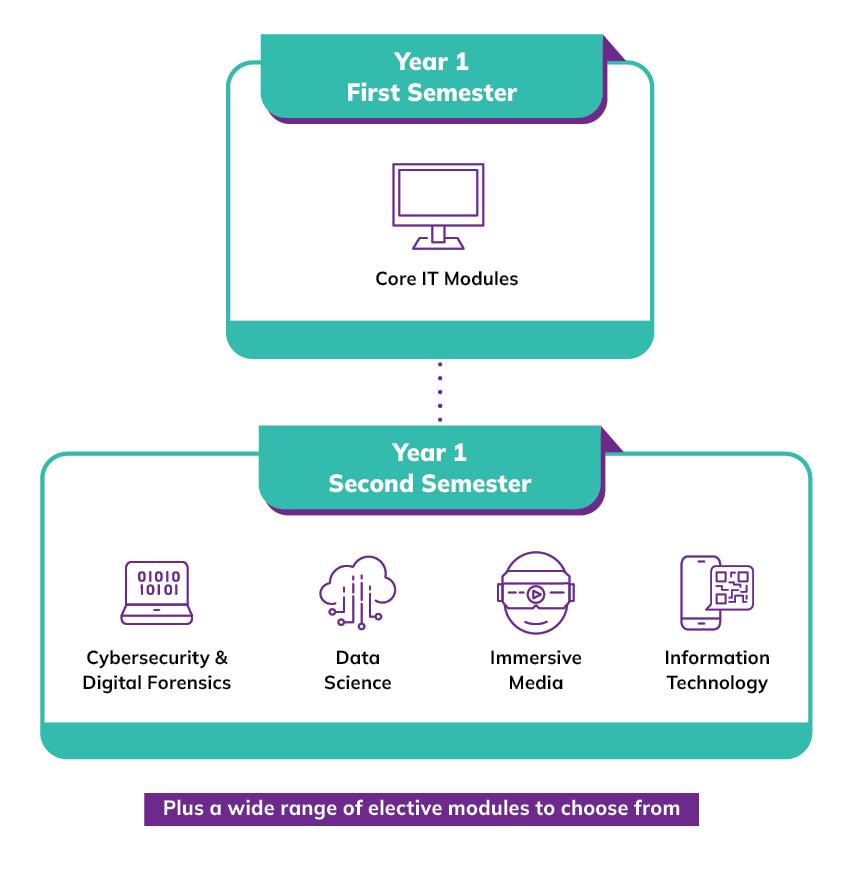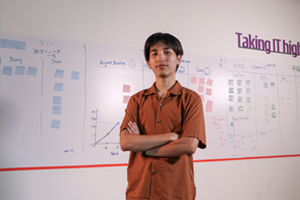Why CICTP?
- Gateway to one of four popular ICT diplomas:
- Cybersecurity & Digital Forensics
- Data Science
- Immersive Media
- Information Technology
- Customise your learning with a wide variety of electives offered in all ICT courses
- Through foundational learning and exposure to industry trends, our career & professional preparation modules will help you choose your career path
About CICTP
Fascinated by infocomm technology (ICT), but still undecided about which course to pursue? The Common ICT Programme (CICTP) lets you explore different disciplines before selecting your learning pathway.
In your first semester, you will learn broad-based fundamentals such as programming and computing mathematics, along with discipline-specific skills in design principles, cybersecurity, and data science. These modules provide insight into various roles and career paths, helping you discover your interests and aptitude.
At the end of your semester, you can choose your preferred discipline:
- Cybersecurity & Digital Forensics
- Data Science
- Immersive Media
- Information Technology
Overview of Your CICTP Journey

Impactful Learning Experience
Entry Requirements
AGGREGATE TYPE ELR2B2-C
To be eligible for consideration, candidates must have the following GCE ‘O’ Level examination (or equivalent) results.
| Subject | 'O' Level Grade |
|---|---|
| English Language | 1-7 |
| Additional Mathematics/Mathematics | 1-6 |
| Any one of the 2nd group of Relevant Subjects for the ELR2B2-C Aggregate Type | 1-6 |
Applicants must also fulfil the aggregate computation requirements for the ELR2B2-C Aggregate Type ( English Language, 2 relevant subjects and 2 other best subjects) listed at www.np.edu.sg/docs/ELR2B2.pdf.
For students with other qualifications, please refer to the NP website for the entry requirements and admissions exercise period.
Candidates with colour vision deficiency, severe vision deficiency or hearing deficiency may encounter difficulties meeting the course requirements and expectations. Those with mild colour vision deficiency are required to undergo an in-house test.
What You Will Learn
Computing Mathematics (4 Credit Units)
This module introduces the basic concepts of relations and functions, matrices, statistical methods and relevant applications. The main emphasis is to develop students’ ability in solving quantitative problems in computing mathematics, probability and statistics.
Cyber Security Fundamentals (2 Credit Units)
This module provides an overview of the various domains of cyber security. It helps to develop an understanding of the importance of cyber security in today’s digital world. It aims to provide an appreciation of cyber security from an end-to-end perspective. It covers fundamental security concepts, tools and techniques in domains such as data, end-user, software, system, network, physical, organization, and digital forensics. It also helps to develop knowledge and skills in identifying common cyber threats and vulnerabilities, and to apply techniques to tackle these issues.
Design Principles (2 Credit Units)
This module introduces students to basic elements and principles of design. Students will practice visual communication and self-branding through aesthetic use of line, shape, form, color, texture, typography, scale, contrast, rhythm and balance. Students will be trained in the usage of digital design tools and application of modern industrial practices to communicate the concepts, designs and solutions.
Data Science Fundamentals (2 Credit Units)
This module provides an overview of Data Science, its importance in the world of data and how it affects the competitiveness of organizations. Learners will learn about the different areas within Data Science and the core pillars essential to practise in the area. Students will also be introduced to Design Thinking. Indicative topics include Introduction to Data Science, Big Data and Analytical Design Thinking.
Fundamentals for IT Professionals 1 (2 Credit Units)
This module provides a broad introduction to the field of ICT by exploring the roles, professional practice, ethical expectations and career development paths of IT professionals. Through a guided inculcation of interpersonal and teamwork skills with strong team bonding spirit, the module aims to deepen students’ commitment to the sector that the course prepares them for. In addition, students will be required to begin charting their career path in the ICT industry by considering crucial aspects such as personal preferences and aptitude, job roles and responsibilities, skills needed and further education.
Programming 1 (5 Credit Units)
This module introduces the fundamentals of programming and how to develop programs using appropriate problem-solving techniques in a modular style. In this practice-oriented module, students are taught how to apply problem-solving skills using a top-down structured programming methodology and given ample practice in translating solutions into computer programs, then test and debug the programs. Topics include data types, variables, expressions, statements, selection structures, loops, simple computation and algorithms, and the use of libraries. Students will also practise the use of pseudocodes, best practices of programming, debugging techniques with the help of tools, development of test cases, and suitable program documentation. In addition, they will study various areas where application software plays a prominent part in helping organisations solve problems. Students will be given ample opportunity for independent and self-directed learning.
English Language Express*
English Language Express aims to give you a better grounding in the English Language and to strengthen the written and oral communications skills that you will need in your academic and professional careers. You will be engaged in writing, reading, listening and speaking activities that will develop your ability to speak and write grammatically, coherently and clearly. You will also hone your reading and listening comprehension skills.
Health & Wellness^ (1 Credit Unit)
This is a Level 1 Core module for all Year 1 students. The module will introduce students to the importance of maintaining both physical and mental health through the knowledge and monitoring of health indicators, and application through appropriate exercises. The aim of the module is to empower students with basic knowledge and skills to be independent and responsible in maintaining overall personal health.
Innovation Made Possible^ (3 Credit Units)
Underpinned by the Design Thinking framework, Innovation Made Possible aims to build creative confidence in you. The module will sensitize you to the process of user-centric problem solving and allow you to discover and hone your innate ability to think creatively, come up with innovations to tackle problems and explore new ideas for your studies and beyond.
Confident Communication: Find Your Voice (VOICE) ^ (3 Credit Units)
The VOICE module aims to empower students to become thoughtful and confident communicators able to tailor a message to suit audience, purpose and context. Students will learn how to use storytelling structures and techniques, persuasive strategies and effective visuals to connect meaningfully with their audience. Through a personalised growth plan, the module encourages students to reflect, set goals and take ownership of their growth and development as communicators. The module employs engaging teaching strategies such as games, thinking routines, masterclasses and workshops, and a celebratory showcase festival at the end to make learning fun and exciting.
^ Critical Core modules account for 10 credit units of the diploma curriculum. They include modules in innovation and world issues, as well as an interdisciplinary project. By bringing students from diverse diplomas together, the interdisciplinary project fosters collaboration to explore and propose solutions for real-world problems. NP aims to develop students to be agile and self-directed learners, ready for the future workplace.


